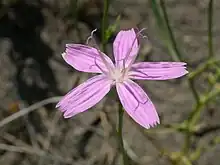Lygodesmia juncea
Lygodesmia juncea, the rush skeletonplant or just skeletonweed, is a species of flowering plant in the family Asteraceae, native to the western and central United States and western Canada.[1] Widespread and considered somewhat weedy, it is adapted to blowing or otherwise disturbed soils, but not to fire.[2] It is a perennial herb. Petals are pink or violet in color and flowers bloom June to September.[3]
| Lygodesmia juncea | |
|---|---|
 | |
| Close-up of flower | |
| Scientific classification | |
| Kingdom: | Plantae |
| Clade: | Tracheophytes |
| Clade: | Angiosperms |
| Clade: | Eudicots |
| Clade: | Asterids |
| Order: | Asterales |
| Family: | Asteraceae |
| Genus: | Lygodesmia |
| Species: | L. juncea |
| Binomial name | |
| Lygodesmia juncea | |
| Synonyms[1] | |
| |
References
- "Lygodesmia juncea (Pursh) D.Don ex Hook". Plants of the World Online. Royal Botanic Gardens, Kew. Retrieved 24 January 2022.
- Pierson, F.B.; Carlson, D.H.; Spaeth, K.E. (2002). "Impacts of wildfire on soil hydrological properties of steep sagebrush-steppe rangeland". International Journal of Wildland Fire. 11 (2): 145. doi:10.1071/WF02037.
- "Lady Bird Johnson Wildflower Center - The University of Texas at Austin". www.wildflower.org. Retrieved 2022-03-14.
This article is issued from Wikipedia. The text is licensed under Creative Commons - Attribution - Sharealike. Additional terms may apply for the media files.
